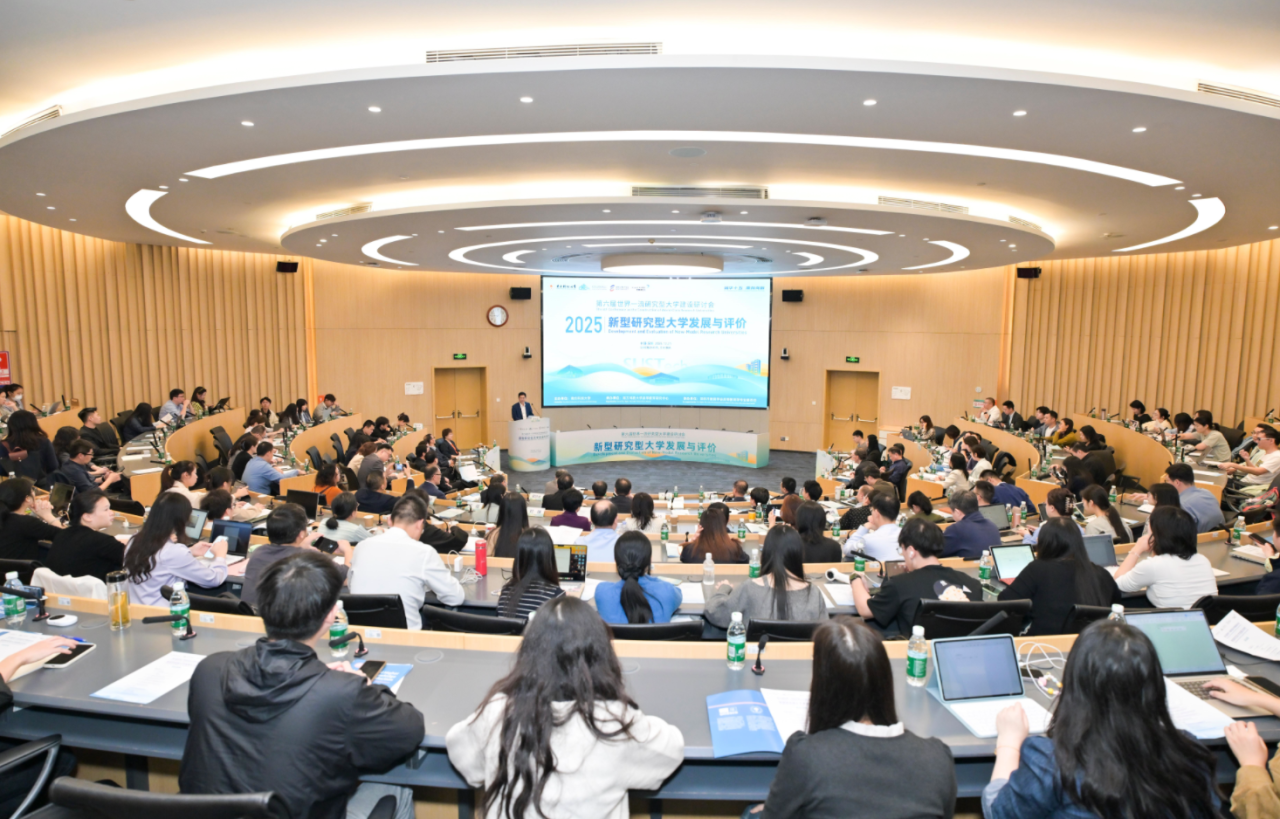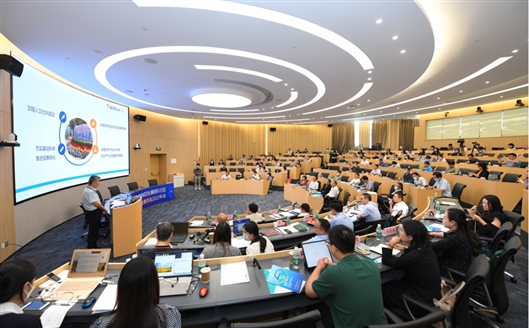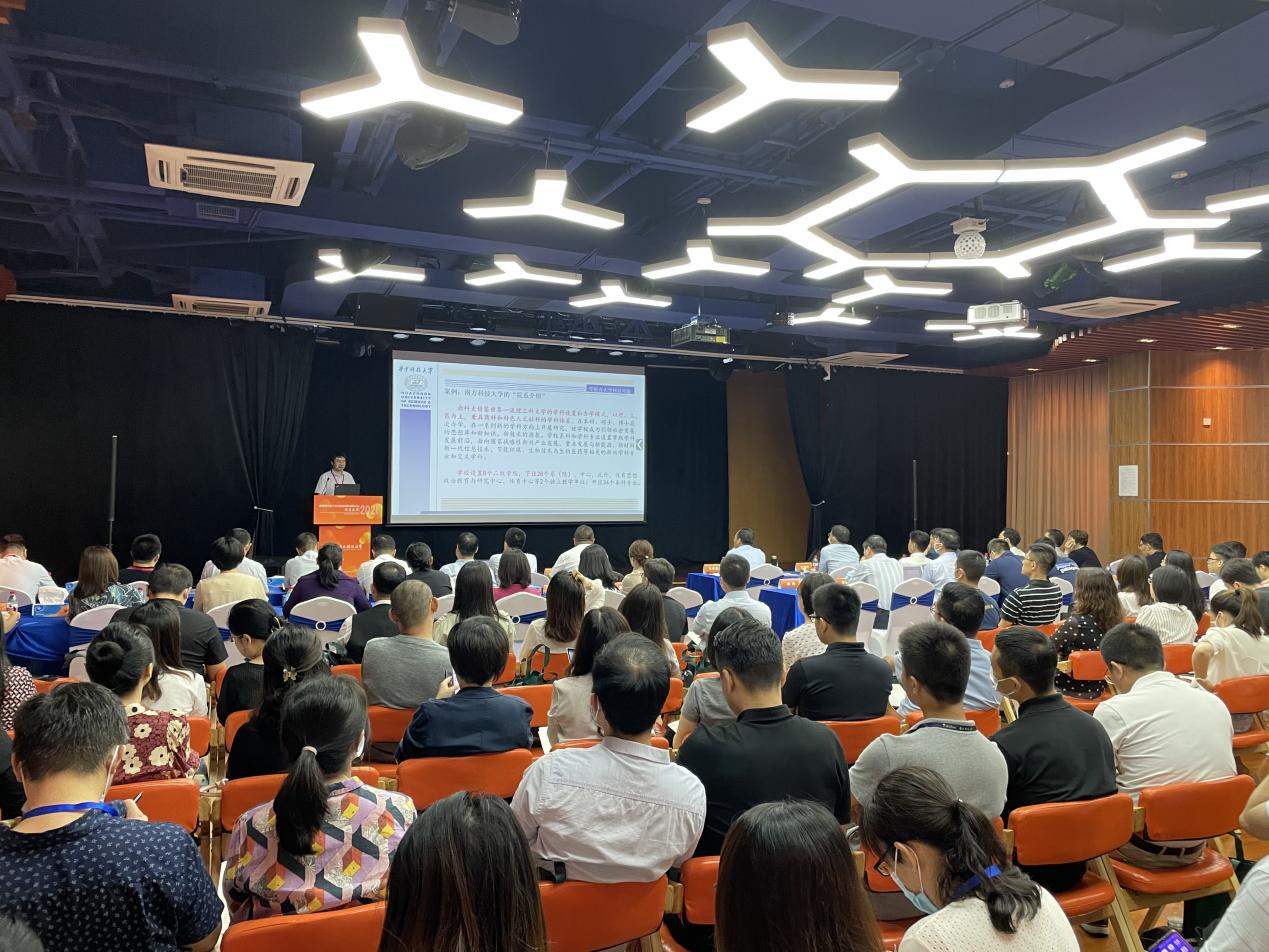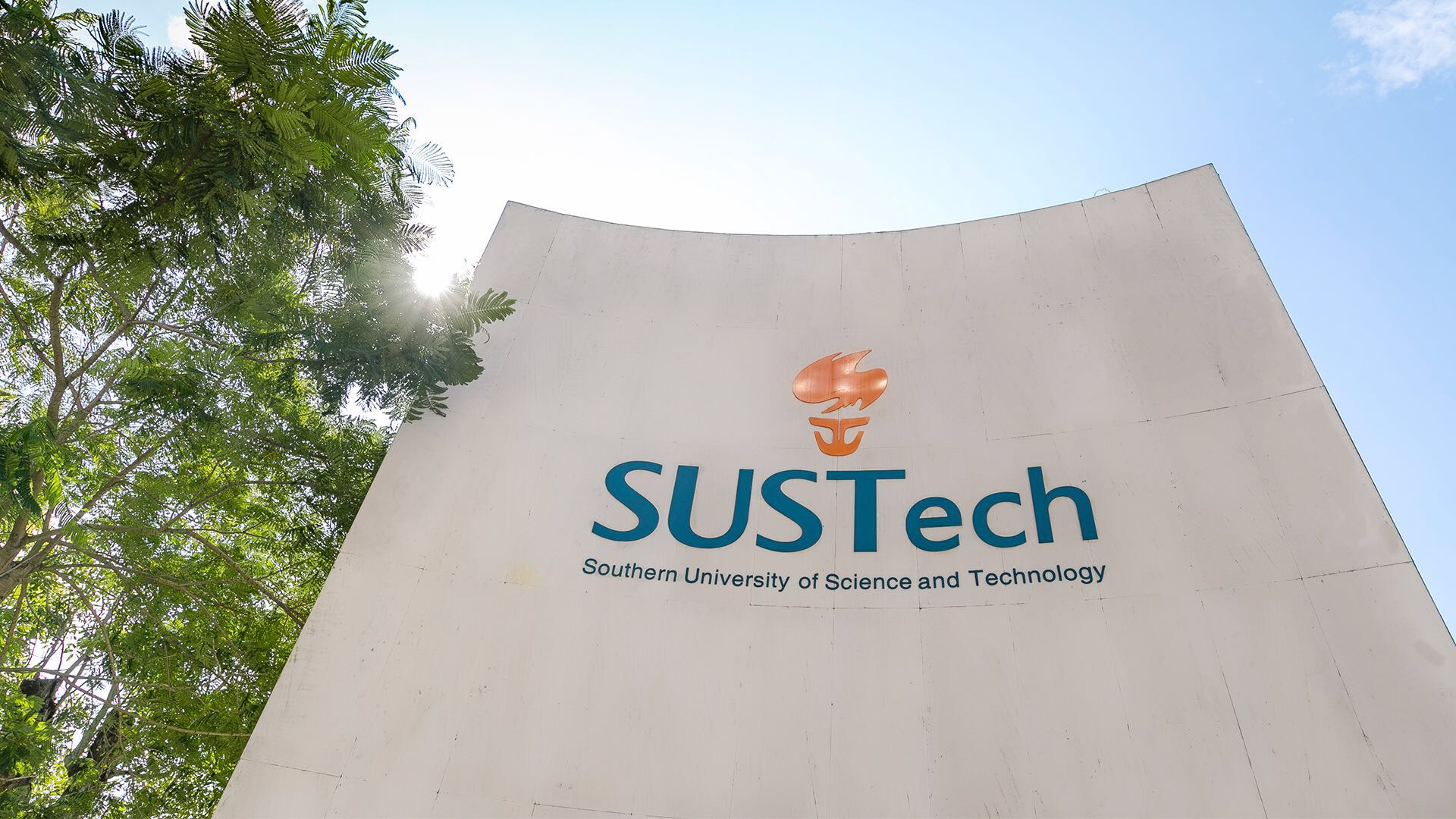2020-08-25
2020 Global Smart Education Conference - International Forum for ICT in Higher Education Transforamtion was held successfully
On the afternoon of August 22, 2020, the "2020 Global Smart Education Conference"-"International Forum for ICT in Higher Education Transformation " was held online and on-site, and was broadcast live through XuetangX. The Higher Education Research Centre of Southern University of Science and Technology is one of the co-organizers of this forum. More than 10 experts from China, the United States, Singapore, the United Kingdom, Australia and other countries conducted in-depth discussions on cutting-age topics such as ICT promoting the innovation and development of higher education and international higher education cooperation and exchanges. Nearly 10,000 people watched the live broadcast, watched the live online broadcast, and got 309 likes and read over 71000 times.
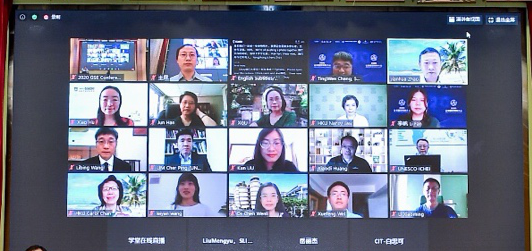
At the welcome remark of the forum, Libing Wang, director of The Information and Knowledge Management (IKM) Unit of the UNESCO Asia and Pacific Regional Bureau of Education, delivered an opening speech. He introduced the higher education informatization work carried out by UNESCO and a lot of work done in the Asia Pacific region in recent years, including the implementation of a series of projects, MOOC curriculum development, and cooperation with the Hong Kong University of Education to jointly promote online and blended learning. He believes that the open university system will provide higher education courses through remote blended mode as the mainstream. It is not easy for traditional universities to integrate online and blended learning into mainstream teaching practice. The new epidemic situation urges us to really think about how to bring online and blended learning into the mainstream of higher education, in which ICT can play a critical role. He believes that the forum provides a good opportunity to explore ICT for promoting education development, sharing advanced experience, actively responding to the UN 2030 education goals, and promoting and strengthening international cooperation in the field of higher education informatization. In his welcome speech, Li Ming, director of International Centre for Higher Education Innovation under the auspices of UNESCO (UNESCO-ICHEI) and Chair Professor of Higher Education Research Centre of Southern University of science and technology, first welcomed the participants and online participants. He introduced the innovative work carried out by the UNESCO-ICHEI and Innovation Centre since its establishment. At present, many higher education cooperation projects have been launched in countries along the The Maritime Silk Road, including Including "Digital Citizenship Education (DCE) Project" and “The Smart Classroom Project”. It has signed MOU with 4 universities in Asia and 7 universities in Africa to form strategic partners. In April 2020, International Institute of Online Education (IIOE) was set up under the leadership of the UNESCO-ICHEI. Its sponsors include partner institutions from developing countries in Asia Pacific and Africa, partner institutions and enterprises in China. After the establishment of IIOE, a variety of training and resource promotion activities have been carried out to provide specific support for teachers in Asian and African universities to carry out online learning during the epidemic period. UNESCO-ICHEI became one of the most active institutions in UNESCO during the outbreak.
In the release session, Jianhua Zhao, Professor of Higher Education Research Centre of South University of science and technology, on behalf of the China Internet learning white paper project team, briefly introduced the main contents of the 2019 China Internet learning white paper, and explained the time, place and method of the formal release of the 2019 China Internet learning white paper. He mentioned that China's Internet learning white paper project starting in 2014, has gradually formed a local brand value after six years of joint efforts, which has played a leading role in guiding and overlooking the whole ecology of Internet Education in the integration and development of education informatization. On behalf of the white paper project team, he welcomed you to the white paper conference to be held in Qingdao on August 29, 2020, which will be broadcast online. On behalf of the Report on Internet Learning in Higher Education team, Professor Xiaoqing Gu of East China Normal University released and systematically introduced the ideas and research results of the "2019 Report on Internet Learning in China’s Higher Education". Through data analysis, she presented the development status of Internet Learning in the field of higher education in 2019, the characteristics of learners in the field of higher education, the problems and trends in the development of Internet learning. She also pointed out that the revolutionary impact of information technology on higher education has initially appeared, but there is still a gap with the requirements of the new era. On behalf of the project team, Wei Zhou, a doctoral student from the Education Department of Beijing Normal University, released the VSE Primer: Concept, Technology, Architecture and Implementation of Virtual and Simulation Experiment.
In the forum theme report, Yun Han, vice president of Higher Education Press and deputy director of the International Online Courses Committee of the Ministry of education; Chirp Lim, visiting professor of Higher Education Research Center of South University of science and Technology and Chief professor of Hong Kong University of Education; Professor Libing Wang, director of The Information and Knowledge Management (IKM) Unit of the UNESCO Asia and Pacific Regional Bureau of Education; Nancy Law, Professor in the Faculty of Education, The University of Hong Kong, Dr. Wenli Chen, National Institute of Education, Nanyang Technological University (NIE NTU), Singapore; Shuaiguo Wang, President of theXuetangX and founder of rain classroom; Dr. Xiaodi Huang, School of computer science, Charles University, Australia; and Professor Nicholas bowkill, University of Derby, UK, delivered wonderful presentations.
Vice President Yun Han introduced the construction and application of iCourse international platform, and systematically introduced the construction foundation, platform construction and operation of iCourse. At present, 291 courses, and 74 universities have participated in the i iCourse, involving medicine, natural science, economics, AI & VR and other disciplines. iCourse has been selected by UNESCO's Global Education Alliance to promote distance education solutions for global learners. Professor chirp introduced the International Institute of online education (IIOE) jointly sponsored by International Centre for Higher Education Innovation under the auspices of UNESCO (Shenzhen, China), 11 top universities in Asia Pacific and Africa, 4 universities in China and 8 high-tech enterprises. China's Belt and Road Initiative, aims to enhance the access of developing countries to quality higher education. It is an online training platform to help China's ICT partners in developing countries. With the support of IIOE online leaning platform to provide high-quality ICT related courses under the supervision of curriculum Steering Committee, IIOE has established clear supporting and evaluation scheme, strong partner institutions and university support, to help teachers in partner institutions in developing countries to improve ICT application ability, and establish hybrid learning and online learning ability, so as to increase their access to high-quality higher education and meet the UNESCO SDG-Education 2030 goals. Director Libing Wang pointed out in his speech that the outbreak of COVID-19 has promoted online learning from the role of auxiliary learning to the mainstream education form, and online plus mixed education will become the new normal of education in the future. He believes that without a supportive ecosystem to address the gaps in different areas, mainstream cannot be achieved. This new ecosystem needs not only policy and mechanism support, ICT infrastructure upgrading, but also institutional capacity building and rethinking the programme development an d course planning. Professor Nancy Law shared from the perspective of Learning Design, and emphasized the importance of learning design specialisation in the new normal. She proposed that Learning Design Studio (LDS), a learning design tool underpinned by robust learning design language, as well as the Design Triangular design framework will provide tool and structure approach to hierarchical and systemic learning design. She then took the curriculum practice of the University of Hong Kong as an example in illustrating how to use LDS and Design Triangular in designing the ICT supported innovative learning design in higher education. Dr. Wenli Chen shared scripting and assessing computer supported collaborative argumentation. She proposed that collaboration is only an improved spiral model to promote, and use apple tree technology to evaluate and support students' writing argumentation, so as to cultivate students' critical ability. Shuaiguo Wang introduced the China’s contribution of XuetangX and rain classroom in the epidemic. As the world's first large-scale Chinese online classroom platform launched by Tsinghua University, XuetangX launched the international version during the epidemic period, and it was open to global learners free of charg and 3 million learners were served every second. In addition, the online international version of the school is connected with the online rain classroom of the school. The course can be used for mixed teaching and learning by teachers and students of rain classroom all over the world after authorization. It also provide big data support related to courses for colleges and universities, and make teaching and learning data visualization. In addition, XuetangX and Tsinghua University jointly launched the “Clone Classroom”and "Weiyang Plan". Professor Xiaodi Huang shared lecturing with online feedback and how to combine learning assessment with learning knowledge symbols of online courses to create a multimedia innovative evaluation mechanism. It uses big data to track and evaluate students' learning process and learning results in a more accurate and diversified way, and provides effective online learning feedback suggestions for supporting students. Professor Nicholas Bowskill introduced the educational transformation in The Post-Autonomy Era of Education , discussed the relevant ideas of educational transformation and development in the era of post autonomous education. He took the case study of Derby University in England as an example, and pointed out that post autonomy in the current new normal was a unique group-based learning method, which took the sense of belonging around the group as the main goal to assist the development within and between groups to support the transformation of education paradigms shift, from individual learning to collective learning under the new normal.
During the Round Table Panel Discussion, Dr. Wenli Chen shared four kinds of mixed teaching modes of Nanyang Polytechnic University during the epidemic period. Professor Xiaoming Li of Peking University proposed that whether it is "supporting teaching" or "improving teaching", online education will be a foregone conclusion. For teachers interested in learning design, the "no man's land" provided by the new normal of online teaching provides teachers with a huge space for creative design. The teaching design under the new normal include design high expectations, set up scaffolding, and encourage students to climb up. Professor Carol Chan of the Faculty of Education, the University of Hong Kong analyzed the challenges and opportunities of higher education in the post epidemic era from the perspective of learning science and knowledge building, and shared innovative design cases of knowledge building in Higher Education during the epidemic period. Professor Xiaoqing Gu of East China Normal University pointed out the necessity of cultivating students' self-regulated learning ability under the new norm of blended learning in post epidemic era and shared feasible suggestions on how to improve students' online learning ability based on the development status of Internet Learning in higher education field in 2019 and the Internet learning habits and learning preferences of learners in higher education field.
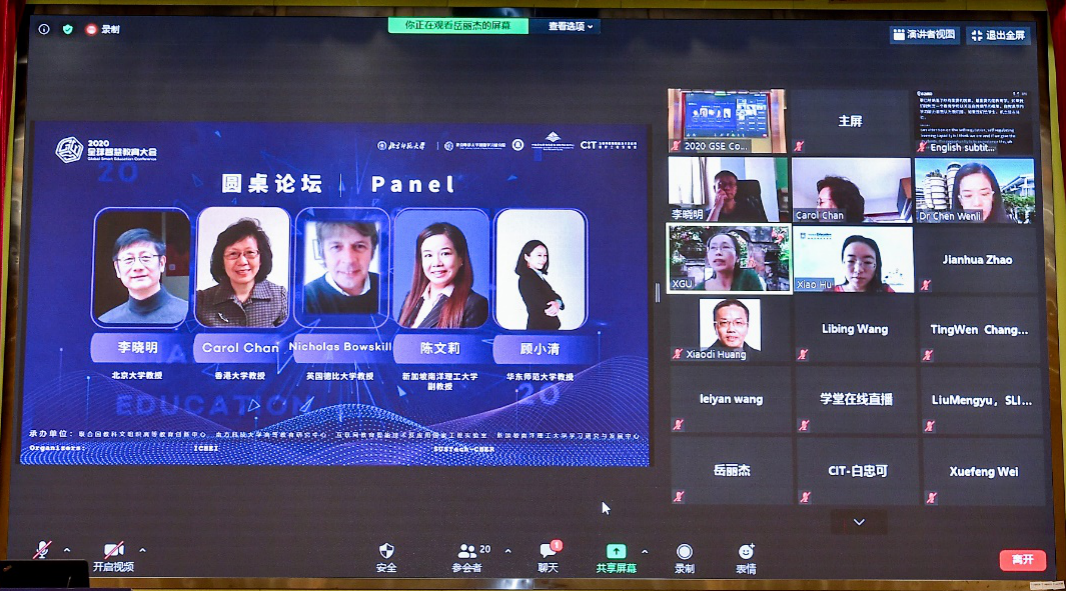
This forum provides a multi perspective communication platform for exploring the use of ICT technology to promote the innovation and development of higher education. Many topics discussed and exchanged are the core issues of the current higher education informatization application, and also the key to improve the quality of education, expand the scale of education, and fight against the new epidemic. We hope that this forum can provide help for the better use of ICT technology to support the innovation and development of higher education, and promote countries around the world, especially developing countries, to better achieve the global 2030 education goal.

